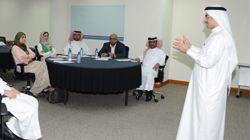

Within its strategy in following-up the results and measuring the return-on-training, and what is known as the concept of the feedback “Feedback”, the officials of the Institute of Public Administration “BIPA” met with the graduates of the new government leaders preparation program “cadres”, where the meeting comes as part of the communication process that has been initiated and implemented in the leadership programs to gauge the return-on-training for the trainees, and recognize the most important attained accomplishments, and listening to the most prominent problems that have been encountered when applying what has been learned during the training programs.
Mr. Ishaq Ameen revealed that during the meeting, we found that 9 of the participants in the new preparation program of government leaders (cadres), have been promoted to the position of Department Director, as this feat of achievements which BIPA is proud of, considered an indicator of the success of the program.
The Executive Director of the Department of Education and Development at the Institute Mr. Ishaq Ameen stated that such meetings provide an opportunity for each trainee to express his opinion about the training program, the gained benefits, observations and recommendations in addition to the exchange of proposals and answering the trainees inquiries in which they develop their strategic and personal plans, he also stressed on the importance of the communication for the training officials at the Institute for following-up and assessment processes, and in a direct way, to their training program, adding that this initiative, which began with the graduates of the cadres program, targeting taking advantage from the experiences of the trainees to develop training programs in the future, in addition to listening to the problems faced by the graduates and working to develop solutions during the next training programs, as well as identifying trainees’ most important achievements that have been attained following their participation experience in the Institute's programs, not to mention the review of the most important challenges facing graduates in their field of work, and the role that the Institute can play to overcome these challenges.
Mr. Al-Ameen explained that the main objective of the evaluation and follow-up training process is to identify the extent of success of the training programs, and the achievement of its set objectives in the training plan, as well as identifying the degree of satisfaction of the trainees in regard to the means and methods of training used in the programs, and determining the extent of success of trainers in delivering and explaining of information to the trainees, and determining the extent of trainees’ benefit from training programs and the relevance of the topics, cases and examples presented during the program, to the actual work, in addition to identifying problems and difficulties faced by trainees during the training program, and recognizing the suitability of the training material that has been distributed to the trainees.
Mr. Al-Ameen pointed out that the aim of the training programs is to develop and enhance the skills of the trainees to be able to achieve further accomplishments that contribute to the improvement and progression of the government work, and therefore this goal requires us to develop a continuous and delicate strategy to follow-up all trainees participating in the training programs.
